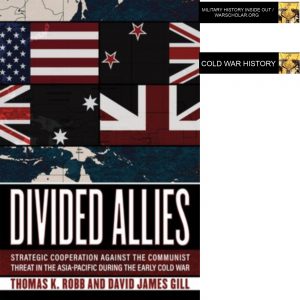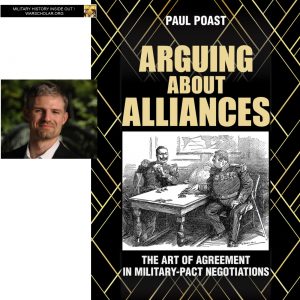Podcast: Play in new window | Download
Subscribe: RSS
 Dr. Thomas Robb is a historian who studies and teaches British and US military history. We spoke about his latest co-authored book on how the ANZUS and SEATO treaties were developed. Check out the book here.
Dr. Thomas Robb is a historian who studies and teaches British and US military history. We spoke about his latest co-authored book on how the ANZUS and SEATO treaties were developed. Check out the book here.
0:44 – Thomas Robb talks about how he got into writing on Cold War Asia-Pacific military relations.
4:03 – Thomas talks about how he begins the book with WWII and moves into the Cold War chronologically.
6:38 – Thomas talks about Australia’s strong concern about tPacific regional security.
8:25 – Thomas discusses France’s decline and Japan’s importance.
8:48 – Thomas talks about West’s concern with Japan’s resurgence economically.
10:04 – Thomas discusses China’s role in the region.
11:50 – Thomas talks about the Soviet role in the Pacific region.
14:12 – Thomas mentions Soviet pilots in the Korean War.
14:52 – Thomas talks about economic versus national needs of the four nations involved.
16:26 – Thomas mentions complaints about ANZUS.
18:38 – Thomas talks about the approach to nuclear weapons.
21:21 – Thomas discusses the US need for the treaty.
22:03 – Thomas talks about the relative military strengths of the four nations negotiating the treaties.
22:27 – Thomas says NZ and Australia were diplomatically punching above their weight.
22:45 – The Philippines not included in ANZUS.
24:57 – Thomas talks about how each nation could militarily contribute to the alliance.
26:01 – A cordon defense would go nuclear.
27:59 – Thomas talks about western concerns that Japan would become communist.
29:05 – Japanese reparations are discussed.
29:45 – Japanese strategic value was shown.
30:59 – Thomas talks about the payment of German reparations after WWI and compares that to the idea of having Japan pay reparations.
32:55 – Thomas talks about British strategic goals and aliances.
34:00 – The US prodded Britain to drop japan as an ally.
34:57 – Thomas talks about Churchill’s sentimentality.
35:54 – Thomas talks about how domestic politics impacted these treaty negotiations.
37:12 – The public used an excuse to not legitimize some treaty negotiations.
38:50 – The Eisenhower library just released a bunch of previously classified documents.
39:42 – Thomas talks about the archives he used for his research including various Presidential libraries.
42:23 – Thomas talks about going to the Truman library.
43:52 – The UK was angry that Australia and New Zealand went off without them and joined the US.
47:54 – Thomas talks about the interplay of racial ideas influenced policy.
50:44 – Thomas talks about how some of the American negotiators had very intense military ideas.
51:25 – Some of the Americans seemed bonkers to the Australians in their goals.
53:47 – The British met with press barons to impugn the character of a foreign minister over ANZUS negotiations.
1:00:19 – Thomas talks about a new project to study the political economy of the US Civil War.
Links of interest
https://www.cornellpress.cornell.edu/book/9781501741845/divided-allies/#bookTabs=3
https://twitter.com/obucoldwarrior
For more “Military History Inside Out” please follow me at www.warscholar.org, on Facebook at warscholar, on twitter at Warscholar, on youtube at warscholar1945 and on Instagram @crisalvarezswarscholar. Or subscribe to the podcast on Apple Podcasts | Stitcher | Spotify
Guests: Thomas Robb
Host: Cris Alvarez
Tags: military, history, military history, conflict, war, interview, non-fiction book, asia-pacific, australia, new zealand, cold war, wwii, world war two, great britain, united states, united kingdom, japan, france, communism, china, NATO, korean war, ANZUS, nuclear weapons, macarthur, truman, philippines, okinawa, malay, SEATO, dean acheson, Russian Empire, Churchill, france, Dulles, US Civil War

